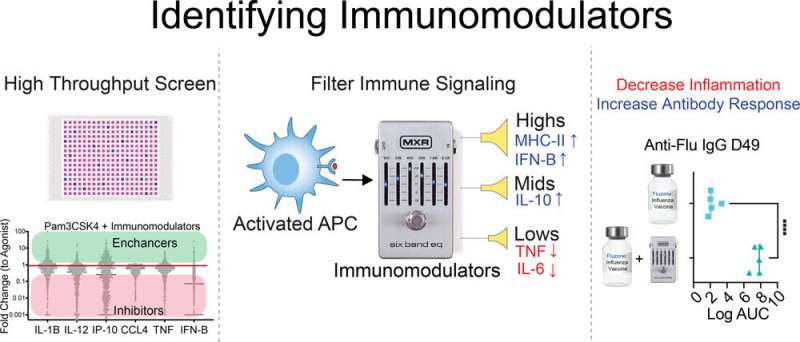This article has been reviewed according to Science X's editorial process and policies. Editors have highlighted the following attributes while ensuring the content's credibility:
fact-checked
peer-reviewed publication
trusted source
proofread
Immunomodulators boost vaccine response and reduce inflammation, finds study

Adjuvants—ingredients that help boost the immune response in vaccines—have been used in vaccines for decades. But inducing a stronger immune response can result in more unwanted side effects, like swelling at the injection site or fever and body aches.
Researchers at the Pritzker School of Molecular Engineering (PME) at the University of Chicago have found that adding small molecules called immunomodulators to vaccine adjuvants gives them the ability to better regulate the body's response to vaccines.
"If you think of adjuvants as a megaphone that stimulates the immune system, then you can think of immunomodulators as a sound mixer," said Jeremiah Kim, a graduate student and co-lead author of the paper. "We're able to selectively tune the immune response to reduce negative side effects."
In models, adding immunomodulators to a flu vaccine increased antibody response, and adding them to a typhoid vaccine reduced inflammation.
The results were published in ACS Central Science. Graduate student Matthew Rosenberger was also a co-lead author of the paper, and both students worked under the direction of Profs. Aaron Esser-Kahn, Andrew Ferguson and Savaş Tay.
"We see this as just the start of what is possible with adjuvants," Esser-Kahn said. "We are excited to keep finding ways to direct more productive and valuable immune responses."
Finding top immunomodulator candidates
Though adjuvants have been around for decades, researchers have been limited in bringing new, specially designed adjuvants to market, since they have not been able to control the body's immune response to them.
"There is still a lot of room to make adjuvants better," Rosenberger said. "And if we do that, we can also increase vaccine compliance and make vaccines easier for people to take."
Immunomodulators work by changing the signaling activity of innate immune pathways within the body. To find the best immunomodulator candidates that could change the activity of the right pathways, the research team conducted a high-throughput screen that looked at 40,000 combinations of molecules. The screening was conducted at UChicago's Cellular Screening Center.
The team developed tools to score the top-performing adjuvant and immunomodulator combinations, then tested the top candidates in a model.
The results showed promise. Researchers found four times as many antibodies in mice that received the flu vaccine combined with an immunomodulator, compared with those that received the flu vaccine alone.
When another immunomodulator candidate was combined with the typhoid vaccine, it reduced inflammation—an indication that unwanted side effects could be reduced, as well.
Expanding immunomodulators to other therapies
While the research team showed the ability of these immunomodulators to both boost effectiveness and reduce inflammation, they now will continue to examine how to best find and tune these molecules for a variety of vaccines and therapies.
"We envision vaccines that have no side effects and that are even more effective than commercial vaccines are now," Kim said. "It's exciting to help make that kind of impact on the world."
Immunomodulators have the potential to be added to COVID-19 vaccines, for example, and they could even be used to better tune immunotherapies, which harnesses a patient's own immune system to fight cancer.
"Immunomodulators have the potential to be added to every kind of vaccine," Rosenberger said. "Our goal is to develop this and take it all the way to clinical trials."
More information: Jeremiah Y. Kim et al, Discovery of New States of Immunomodulation for Vaccine Adjuvants via High Throughput Screening: Expanding Innate Responses to PRRs, ACS Central Science (2023). DOI: 10.1021/acscentsci.2c01351


















